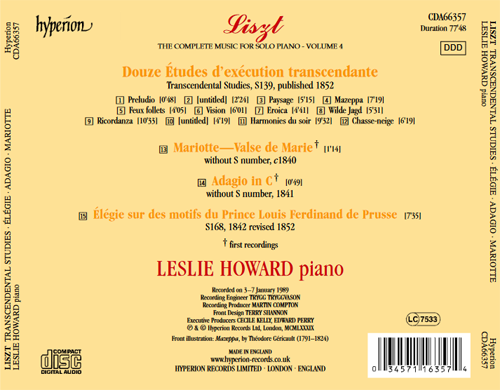
The history of the Transcendental Studies is tolerably well known, but may be briefly recapitulated here. In 1826, not yet fifteen years of age, the young prodigy published the first instalment of what promised to be an ‘Étude en 48 exercises’ in which Liszt intended to run twice through all the keys in the pattern C major, A minor, F major, D minor, etc, and the volume included twelve short studies of considerable flair, somewhat under the influence of his teacher Czerny (whose many studies are not quite of the calibre of the others mentioned above, however useful for younger players!) but showing much melodic invention and technical skill. (The remaining thirty-six were never composed, so the set of keys used remains within the flat side of the circle of fifths. Interestingly, Lyapunov’s twelve Transcendental Studies, written in Liszt’s memory, complete the cycle of keys.) In 1837, at the height of his Glanzperiode, Liszt took these little pieces (variously published as opus 1 or opus 6) and developed a formidable set of studies which, as Schumann noted in his laudatory review, were probably too difficult for anyone other than Liszt to play musically. The essential musical poetry of the pieces was rescued by Liszt from the more extreme technical demands in the final version published in 1852, in which the pieces become by no means easy, but much clearer in musical intent. The D flat study of the 1826 version never reappeared, but was replaced by the original E flat study transposed and much extended. The E flat study in the 1837 set is, therefore, new, but uses a fragment from the introduction to Liszt’s early Impromptu on themes of Rossini and Spontini, opus 3. The D minor study was reissued some time before the final version, with the title Mazeppa and a dedication to Victor Hugo. In the final version, titles are appended to ten of the pieces. Of course these titles are only guides for performance rather than clues to the sources for Liszt’s inspiration, but they are evocative enough, and often uncannily paraphrase the atmosphere conjured up by the music. The second and third versions of these studies both bear a dedication to Czerny. Liszt exploits every then-known device of piano technique in a set of original structures in which the dramatic argument is often heightened by harmonic tensions and juxtapositions very daring for their day.
More notes of Leslie Howard
8.2.22
FRANZ LISZT : Transcendental Studies (Leslie Howard) (1998) APE (image+.cue), lossless
Assinar:
Postar comentários (Atom)
+ last month
CHRISTINA BJORDAL – Warrior Of Light (2009) FLAC (tracks+.cue), lossless
"WARRIOR OF LIGHT" was released 28th of September 2009. Anders Aarum (Piano), Marius Reksjø (Bass) and Harald Levang accompanies h...





.jpg)

.jpg)




https://nitro.download/view/7624B42F3D9D162/Franz_Liszt_-Transcendental_Studies.rar
ResponderExcluir